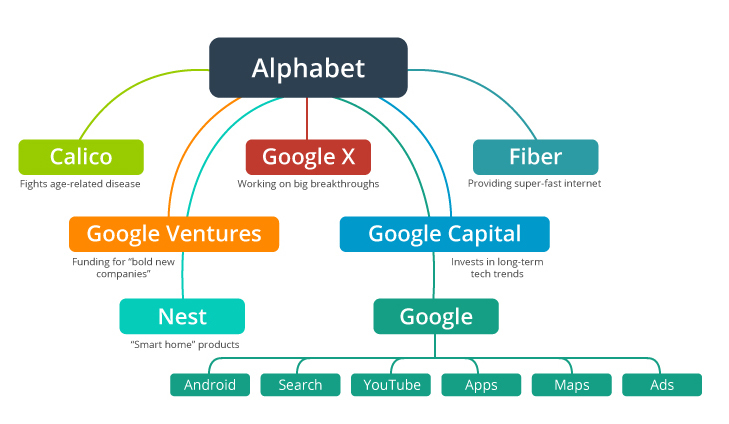Be like Google, be better than Google

Google quickly became one of the most recognized companies in the world. Founded in 1998, the company currently has more than 50 thousand employees and has a market value in excess of $ 350 billion. This is simply incredible growth, given the fact that the company has not even been around for 20 years.
What is even more surprising is that Google remains at the forefront of strikingly multiple innovations. He still feels like a small company in many aspects, which allowed him to be at the forefront of an ultra-competitive environment, not bogged down in bureaucratic procedures or politics.
Of course, having an almost unlimited supply of cash you will not be particularly affected, but many other companies with exactly the same capital fly like plywood over Paris. In fact, many of the things Google does extremely well, and along the way I will try to focus on this. Especially on how you can use the experience of Google in managing a large organization. Since Google is still a private company, not everything can be taken literally as a guide to action, but given the pragmatism of business structures, you can learn a lot about the feasibility and benefits. If you remember that Google is a technology giant, you can learn a lot about the introduction of new “parts” and the work of existing technologies.
1. First of all, the main business must be impeccable
With a cursory glance, it might seem like Google is doing a million things at the same time, participating in many areas, from provincial broadband and virtual reality, to “ambulances” with autopilot. All this became possible thanks to the main business of the company - search and advertising. Advertising continues to account for the majority of the company's revenue, and according to internal corporate research, Google accounts for more than 10 percent of all advertising costs in the United States.
Google knows this, and in spite of everything, continues to perform its tasks admirably. Considering how much advertising has changed over the past two decades, this task is not an easy one. Although understanding the core business is still half the battle. The correct concept and work based on this position makes life easier for any business. This is not always obvious, but when considering any business of Google, you can see that it is at least somehow connected with the main activities of the company.
Government agencies must do the same. Management needs an understanding of its core functions and their meticulous performance. The flawless performance of his role makes it possible to do other things. This approach provides a solid foundation for strategic decision making. Without the concept of basic goals, it is very easy to spray on side tasks, which ultimately leads to the fact that no task will be performed properly. And this is sad.
2. Work with talented people
Hiring a talent is hard, just because it's hard to find. Mediocrity will draw itself. Talented people rarely kneel and are almost always obstinate. Even if this happens, most of them despise the obsolete and mundane bureaucratic concepts that prevail in many large companies and government agencies, and therefore carefully avoid them. Google understands this and, if necessary, does everything to get the right person, providing him with opportunities for self-realization, since for a talented person this is much more important than money. For this, the search engine has a whole breakthrough of personnel specialists.
Governments and corporations should take a similar approach. You should not stoop to advertisements at public transport stops, but a dumb “bounty hunt” is unacceptable. Most organizations know what they want from an employee, and today we have the opportunity to hire exactly who we need. So why is the civil service and big business still subject to outdated employment standards?
3. Focus on data
Google has some of the largest and most complex data centers in the world. His business model is based on storing and analyzing huge amounts of data, and I think this is “open secret” for everyone. The most interesting thing is how the company receives this data. Some of them Google buys, but receives a large part through its products and services. Data collection is built into any Google product (and the main thing, as you remember, is the search ). Often we don’t realize this, but if we run out of toilet paper, most likely “Google knows ..” There is nothing wrong with that, we just all have to remember this (I'm not paranoid, nothing more, but some of my friends stick the camera on laptops if they don’t communicate via Skype).
In fact, I believe that state sponsors and other "heavy" organizations should take this approach as the basis of their activities. They should collect data, and I would like it with our permission. Every time during an interactive interaction, offices must save data, even if they don’t know why they need it. Saving data is a priority. The more data, the more accurate the decisions made on their basis.
4. Project teams
The concept of special project teams is nothing special, but its implementation may be somewhat more complicated than it seems at first glance. However, this does not apply to Google, which has mastered this art. Every new challenge Google delegates to the right people. The company finds people who have the necessary skills and passion for the subject, which is even more important. At the same time, teams get almost complete freedom to implement ideas and completely concentrate on this.
Many companies and government agencies are also trying to use a similar approach, with one difference, no one exempts from the current duties of employees, which practically eliminates the entire positive effect of the methodology. Thus, for the successful implementation of ideas in this way, a temporary review of the duties of employees is absolutely necessary. Focusing on the project accelerates the implementation and validation of its viability. Very rarely, positive results are obtained at the outlet, executed after the sleeves, long-term construction. In addition, daily tasks may suffer from the combination. Do you need it?
5. Allocated time for innovation
Many of us are familiar with the twenty percent time allocation rules for Google and innovative products that have come out of it. For those who don’t know, I explain that Google allows its employees to spend up to 20% of their time on third-party projects of interest to them. The brainchild of such a policy are Gmail and AdSense. The end result of this provision is a culture of side projects.
Something similar could be done in any company. Maybe in the corporate bowels of your office a new project has been latently ripening for a long time?
6. "Flights to the Moon"
In 2010, Google created a dedicated Google X research lab. In some respects, this is similar to the next phase of the 20% policy. Most of the crazy projects (inside Google they call them “moonshots”) were invented here. From this lab, ideas often find their way back to the world, both as divisions of Google and as subsidiaries.
7. Operate with beta versions
Google is known for its extensive beta testing of some of its products. Gmail has been in beta for five years, and Google Docs for three years. During this time, Gmail has acquired more than 100 million users, which was not prevented by the beta label. Beta is good because users forgive some mistakes, and the product continues to improve. In the culture of technology startups, the concept of beta is rooted. Many companies launch products with limited functionality or possible errors to bring them to light. Thus, they can receive feedback for more precise product customization and elimination of errors.
As co-founder of LinkedIn Reed Hoffman says(Reid Hoffman): “If the first version of your product does not bother you, you started too late.” Much easier to release MVP, and then release patches and patched releases. After all, Moscow was not built immediately.
And finally
Looking at the business model of Google, you can see that it works as a collection of small heterogeneous companies, as evidenced by the last steps in the reorganization (Alphabet). Restructuring of Google served both the financial and legal goals of the business, and to preserve the logic of the work of all departments as small innovative companies. This has been Google since its inception.

If large private corporations or government agencies adopt at least some of the listed techniques, much will change. Most companies do not have such resources, but with the right goal , you can get a route to it through the intersection of innovation and motivation, and this will really make the world a better place.
And don’t forget - “don’t be evil!”
